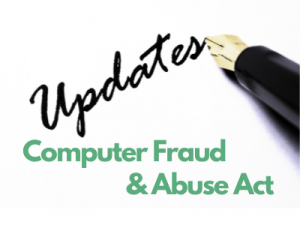Steven M. Gardner v. CafePress Inc., 3:13-cv-1108. This opinion perhaps fell through the cracks because of the attention that followed Garcia v. Google, but it can have as much of an impact on internet service providers as the Garcia decision will have on filmmakers. It involves CafePress, an e-commerce vendor, and plaintiff’s copyright infringement against it. CafePress moved for summary judgment, asking that the court hold that it is protected by the safe harbor under the Digital Millennium Copyright Act (DMCA), 17 USC 512(c). The court denied CafePress’s motion, finding that it cannot conclude whether CafePress is entitled to the DMCA safe harbor. The court discusses a number of reasons why CafePress might not entitled to a safe harbor. Considering that each of those factors is addressed individually, it is possible that any one of them would be sufficient for a company to lose the safe harbor. These findings can have an impact on how internet service providers, including online vendors and social media platforms, conduct business. Most strikingly, the court finds that because CafePress strips metadata from the images submitted, it is possible that it is interfering with “standard technical measures” to protect copyrights. Many social media platforms strip metadata from user submissions, so this finding casts doubt on whether that it is a wise policy. The court also finds that CafePress is different than other online vendors like Amazon and eBay, because it directly sells products to online shoppers, determines retail prices for its products, and only pays users a royalty or commission. Therefore, the court finds it might not be a “service provider” entitled to the safe harbor. The court further finds that user submissions might not be “by reason of the storage at the direction of the user” because CafePress determines “in its sole and absolute discretion” which images are sold, it can modify designs on products, and it sets the retail prices and pays royalties to users. For similar reasons, the court finds that CafePress might have a “financial benefit directly attributable to the infringing activity” and a “right and ability to control such activity.” Mark’s note: Many online services engage in practices similar to those conducted by CafePress, and online business are often unaware of its activities that might call into question its highly-valued protection of the DMCA safe harbor. This decision highlights the concerns over these practices. The decision: Gardner v. CafePress (Mark) For informational purposes only. Not legal advice. We are not representing parties in this action. For more information about my practice, see: Mark H. Jaffe and legal tidbits on twitter at: @MarkJKings]]]]> ]]>

Webinar Invite: Michael Hassard joins a virtual panel on Intellectual Property and Smart Contracts – Oct 20, 2022 3pm ET
Firm Associate Michael Hassard will be part of a virtual panel discussion on on Intellectual Property (IP), Smart Contracts, Branding, and Usage Rights. October 20, 2022 at 3pm Eastern. Sign up to attent.



